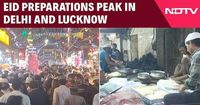Eid al-Fitr, also known as the "Festival of Breaking the Fast," is a significant event celebrated by Muslims worldwide, marking the end of Ramadan, a month of fasting and reflection. This year, on March 29, 2025, the atmosphere in various regions, especially in places like Delhi and Lucknow, is filled with joy and anticipation as preparations for the festival reach their peak.
As the sun rises on Eid, families gather for Eid ki Namaz, a congregational prayer that symbolizes gratitude and the spirit of community. This tradition is an essential part of Eid celebrations, allowing Muslims to express their thankfulness to Allah and seek blessings for the year ahead.
In Lucknow, the Akbari Gate locality is bustling with activity, as locals and visitors alike soak in the festive atmosphere. The aroma of local flavors fills the air, enticing people to indulge in the various culinary delights that are synonymous with this joyous occasion.
While many are familiar with popular Eid dishes such as kebabs, sheer khurma, and biryani, there exists a treasure trove of lesser-known delicacies that add to the richness of the celebration. Here are six must-try Eid delicacies that are often overlooked yet hold a special place in the hearts of many.
Manti is a dish native to Turkey and Central Asia, consisting of small, steamed or boiled dumplings filled with spiced meat. Typically served with yogurt and garlic sauce, Manti offers a delightful blend of flavors that make it a perfect addition to any Eid feast.
Lukaimat, hailing from the UAE and Gulf countries, are golden, crispy fried dumplings drizzled with date syrup or honey. These Emirati sweet treats resemble doughnuts and are a beloved choice during Eid celebrations, offering a sweet finish to the festive meal.
Mrouzia is a fragrant lamb dish from Morocco, cooked with saffron, honey, almonds, and cinnamon. This unique combination of sweet and savory flavors makes Mrouzia a standout dish that captures the essence of Eid culinary traditions.
Bakarkhani, popular in Bangladesh, Pakistan, and India, is a thick, flaky, and slightly sweet bread often paired with rich curries like Nihari and Korma. This bread, made with refined flour, sooji, sugar, salt, ghee, and topped with sesame seeds and cardamom, is a staple that enhances any Eid spread.
Tufahija, a Bosnian dessert, is made from poached apples stuffed with walnuts and sugar, topped with whipped cream. This delightful treat is not only a visual spectacle but also a delicious way to celebrate the sweetness of the occasion.
Maqlooba, originating from Palestine, is a traditional Middle Eastern dish made with layers of rice, meat, and vegetables, all cooked together and flipped upside down before serving. This dramatic presentation and the harmonious blend of flavors make Maqlooba a must-try for those looking to experience authentic Eid cuisine.
As families gather around the table to enjoy these dishes, Eid al-Fitr becomes more than just a meal; it transforms into a celebration of culture, tradition, and togetherness. The act of sharing food brings people closer, fostering a sense of community and belonging.
In addition to the culinary delights, Eid is also a time for heartfelt messages and wishes. Many people exchange greetings and well-wishes, expressing their hopes for peace, prosperity, and happiness in the coming year. Various platforms and social media channels are buzzing with messages that capture the spirit of Eid, reminding everyone of the importance of love and unity.
This year, as the world celebrates Eid al-Fitr, the essence of the festival remains unchanged. It is a time for gratitude, reflection, and celebration, where the bonds of family and community are strengthened. The rich tapestry of flavors and traditions associated with Eid serves as a reminder of the diverse cultures that come together to celebrate this significant occasion.
As the festivities unfold, the excitement in cities like Lucknow and Delhi showcases the vibrant spirit of Eid. From the bustling markets filled with shoppers to the warm gatherings of families, the festival truly embodies the joy of togetherness.
In conclusion, Eid al-Fitr is not just a day marked by prayer and feasting; it is a celebration of life, love, and the blessings we share. Whether through the savory dishes enjoyed or the heartfelt wishes exchanged, the festival offers a unique opportunity to reflect on the importance of community and the joy of giving. As the sun sets on this special day, the memories created will linger long after the last bite of sweet treats is savored.






